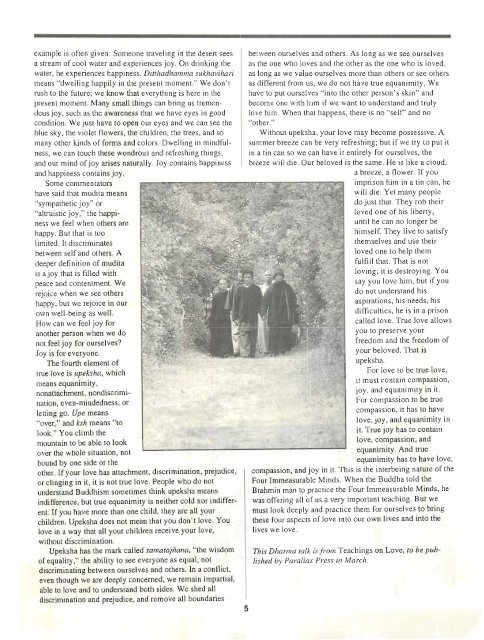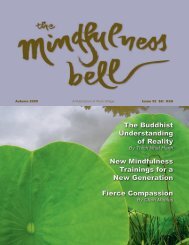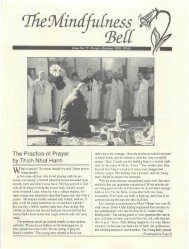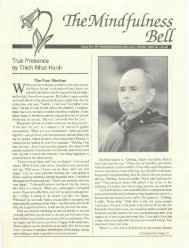View full issue in PDF - The Mindfulness Bell
View full issue in PDF - The Mindfulness Bell
View full issue in PDF - The Mindfulness Bell
You also want an ePaper? Increase the reach of your titles
YUMPU automatically turns print PDFs into web optimized ePapers that Google loves.
example is often given: Someone travel<strong>in</strong>g <strong>in</strong> the desert sees<br />
a stream of cool water and experiences joy. On dr<strong>in</strong>k<strong>in</strong>g the<br />
water, he experiences happ<strong>in</strong>ess. Ditthadhamma sukhavihari<br />
means "dwell<strong>in</strong>g happily <strong>in</strong> the present moment." We don't<br />
rush to the future; we know that everyth<strong>in</strong>g is here <strong>in</strong> the<br />
present moment. Many small th<strong>in</strong>gs can br<strong>in</strong>g us tremendous<br />
joy, such as the awareness that we have eyes <strong>in</strong> good<br />
condition. We just have to open our eyes and we can see the<br />
blue sky, the violet flowers, the children, the trees, and so<br />
many other k<strong>in</strong>ds of forms and colors. Dwell<strong>in</strong>g <strong>in</strong> m<strong>in</strong>dfulness,<br />
we can touch these wondrous and refresh<strong>in</strong>g th<strong>in</strong>gs,<br />
and our m<strong>in</strong>d of joy arises naturally. Joy conta<strong>in</strong>s happ<strong>in</strong>ess<br />
and happ<strong>in</strong>ess conta<strong>in</strong>s joy.<br />
Some commentators<br />
have said that mudita means<br />
"sympathetic joy" or<br />
"altruistic joy," the happ<strong>in</strong>ess<br />
we feel when others are<br />
happy. But that is too<br />
limited. It discrim<strong>in</strong>ates<br />
between self and others. A<br />
deeper def<strong>in</strong>ition of mudita<br />
is a joy that is filled with<br />
peace and contentment. We<br />
rejoice when we see others<br />
happy, but we rejoice <strong>in</strong> our<br />
own well-be<strong>in</strong>g as well.<br />
How can we feel joy for<br />
another person when we do<br />
not feel joy for ourselves?<br />
Joy is for everyone.<br />
<strong>The</strong> fourth element of<br />
true love is upeksha, which<br />
means equanimity,<br />
nonattachment, nondiscrim<strong>in</strong>ation,<br />
even-m<strong>in</strong>dedness, or<br />
lett<strong>in</strong>g go. Upe means<br />
"over," and ksh means "to<br />
look." You climb the<br />
mounta<strong>in</strong> to be able to look<br />
over the whole situation, not<br />
bound by one side or the<br />
other. If your love has attachment, discrim<strong>in</strong>ation, prejudice,<br />
or cl<strong>in</strong>g<strong>in</strong>g <strong>in</strong> it, it is not true love. People who do not<br />
understand Buddhism sometimes th<strong>in</strong>k upeksha means<br />
<strong>in</strong>difference, but true equanimity is neither cold nor <strong>in</strong>different.<br />
If you have more than one child, they are all your<br />
children. Upeksha does not mean that you don't love. You<br />
love <strong>in</strong> a way that all your children receive your love,<br />
without discrim<strong>in</strong>ation.<br />
Upeksha has the mark called samatajii.ana, "the wisdom<br />
of equality," the ability to see everyone as equal, not<br />
discrim<strong>in</strong>at<strong>in</strong>g between ourselves and others. In a conflict,<br />
even though we are deeply concerned, we rema<strong>in</strong> impartial,<br />
able to love and to understand both sides. We shed all<br />
discrim<strong>in</strong>ation and prejudice, and remove all boundaries<br />
5<br />
between ourselves and others. As long as we see ourselves<br />
as the one who loves and the other as the one who is loved,<br />
as long as we value ourselves more than others or see others<br />
as different from us, we do not have true equanimity. We<br />
have to put ourselves "<strong>in</strong>to the other person's sk<strong>in</strong>" and<br />
become one with him if we want to understand and truly<br />
love him. When that happens, there is no "self' and no<br />
"other."<br />
Without upeksha, your love may become possessive. A<br />
summer breeze can be very refresh<strong>in</strong>g; but if we try to put it<br />
<strong>in</strong> a t<strong>in</strong> can so we can have it entirely for ourselves, the<br />
breeze will die. Our beloved is the same. He is like a cloud,<br />
a breeze, a flower. If you<br />
imprison him <strong>in</strong> a t<strong>in</strong> can, he<br />
will die. Yet many people<br />
do just that. <strong>The</strong>y rob their<br />
loved one of his liberty,<br />
until he can no longer be<br />
himself. <strong>The</strong>y live to satisfy<br />
themsel ves and use their<br />
loved one to help them<br />
fulfill that. That is not<br />
lov<strong>in</strong>g; it is destroy<strong>in</strong>g. You<br />
say you love him, but if you<br />
do not understand his<br />
aspirations, his needs, his<br />
difficulties, he is <strong>in</strong> a prison<br />
called love. True love allows<br />
you to preserve your<br />
freedom and the freedom of<br />
your beloved. That is<br />
upeksha.<br />
For love to be true love,<br />
it must conta<strong>in</strong> compassion,<br />
joy, and equanimity <strong>in</strong> it.<br />
For compassion to be true<br />
compassion, it has to have<br />
love, joy, and equanimity <strong>in</strong><br />
it. True joy has to conta<strong>in</strong><br />
love, compassion, and<br />
equanimity. And true<br />
equanimity has to have love,<br />
compassion, and joy <strong>in</strong> it. This is the <strong>in</strong>terbe<strong>in</strong>g nature of the<br />
Four Immeasurable M<strong>in</strong>ds. When the Buddha told the<br />
Brahm<strong>in</strong> man to practice the Four Immeasurable M<strong>in</strong>ds, he<br />
was offer<strong>in</strong>g all of us a very important teach<strong>in</strong>g. But we<br />
must look deeply and practice them for ourselves to br<strong>in</strong>g<br />
these four aspects of love <strong>in</strong>to our own lives and <strong>in</strong>to the<br />
lives we love.<br />
This Dharma talk is from Teach<strong>in</strong>gs on Love, to be published<br />
by Parallax Press <strong>in</strong> March.
















